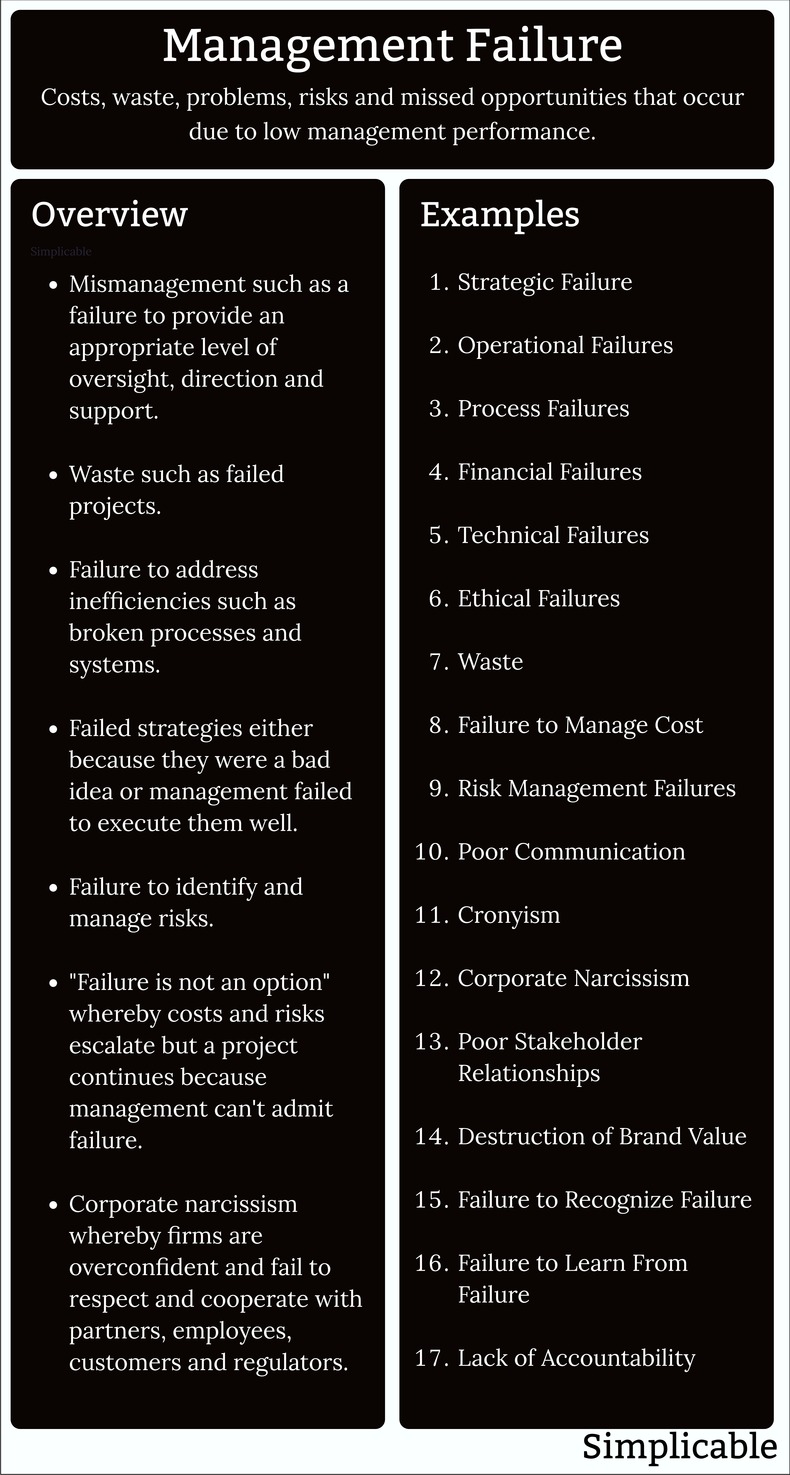Mismanagement
Mismanagement is a serious failure of duty that leads to losses, errors, omissions or fraud. For example, a CFO who misreports the financial position of a firm leading to loss of confidence in the firm by regulators, creditors, investors, partners, customers and employees.Defeatism
Defeatism is the act of working against the goals of an organization. For example, a manager who tries to sabotage a project they perceive as originating with a political foe.Overplanning
Analysis paralysis whereby a team spends too long planning too far into the future while the competition move forward.Productivity Shortfall
Productivity is the amount of value created in an hour of work. A failure to produce much value despite mounting time invested is a common management failure. For example, a team that devotes its resources to busy work.Performance Shortfall
An inability to meet goals that have been agreed upon with stakeholders. This is often a mild form of failure where teams have worked hard to meet goals but have fallen short.Under Planning
Failure to adequately plan for a change. For example, implementing a new system without any thought to how your business processes will move to the system.Risk Mismanagement
A failure to identify and manage risk. For example, a credit reporting agency that fails to take basic steps such as encryption to secure sensitive private data.Change Management Failure
Sponsoring change without leading change such that it has little or no chance of succeeding. For example, a business unit that sponsors an IT project without clearing business issues that prevent the project from progressing.Defense of the Status Quo
Managers who resist change out of a preference for stability. For example, a manager who resists the work at home policies of her organization only to find that the team has no processes in place when a business disruption occurs such that everyone needs to work at home.Failure to Lead
A manager who fails to take direction and control of a team such that team members ignore their authority.Lack of Control
A failure to implement basic internal controls such as a manager who fails to track vacation time such that a team violates corporate policy.Authoritarianism
An authoritarian personality who uses authority to enjoy a sense of personal power over others. For example, a manager who sets team members up to fail in order to maintain and enjoy a sense of power.Perverse Incentives
Managers who have incentives to do things that aren't good for an organization. For example, a weak manager who has incentives to recruit an untalented team so that they won't challenge them for their position. This occurs when the manager isn't under much external pressure to perform.Rent Seeking
Rent seeking is the process of seeking more reward without creating more value. For example, managers who view internal politics as the goal of their efforts as opposed to achieving the goals of their organization.Neglect of Culture
Allowing an organizational or team culture to turn negative. For example, allowing unreasonably disrespectful behavior to thrive without consequence.Bozo Explosion
Managers who have a career pattern of hiring friends and former colleagues and giving them inflated job titles and salaries. This is then reciprocated such that nobody in this social network is every out of work despite low performance. In other words, these groups act as teams going from one organization to the next with rent seeking as their only goal.Optimization Myopia
Managers who optimize the same numbers over and over again because this worked in the past while missing a broader competitive problem. For example, a retail CEO who focuses on advertising conversion rates while ignoring failing merchandising, product quality and customer service issues that are allowing competitors to take market share.Big Picture Thinking
Managers who think big such that few of their ideas are relevant to current problems. For example, a 3D printing executive who is too busy imagining the future to deal with product quality problems that are destroying the firms brand.Poor Estimates
Providing unrealistically low estimates of work duration and cost such that projects are destined to fail from the start. This is often due to excessive optimism or a failure of diligence.Corporate Narcissism
Organizational narcissism whereby managers become arrogant due to the social status attached to a large firm. This tends to translate to a condescending attitude towards stakeholders such as investors, partners and customers. For example, a major IT consulting firm that always blames the customer when a project they are managing fails.Strategic Failure
Managers who successfully implement a poor strategy. For example, an appliance manufacturer that converts all its products to IoT such that they need to connect to the internet to function while ignoring customer preferences for privacy and security. This may allow a competitor who aligns to customer preferences to take significant market share.Summary
Manage failures are costs, waste, risks and missed opportunities that occur due to low management performance. It is fully possible for management to add negative value whereby they can damage the brand value, customer relationships, operational and financial stability of a firm.
| Overview: Management Failure | ||
Type | ||
Definition | A shortfall of duty or performance in directing and controlling an organization, function or team. | |
Related Concepts | ||



































